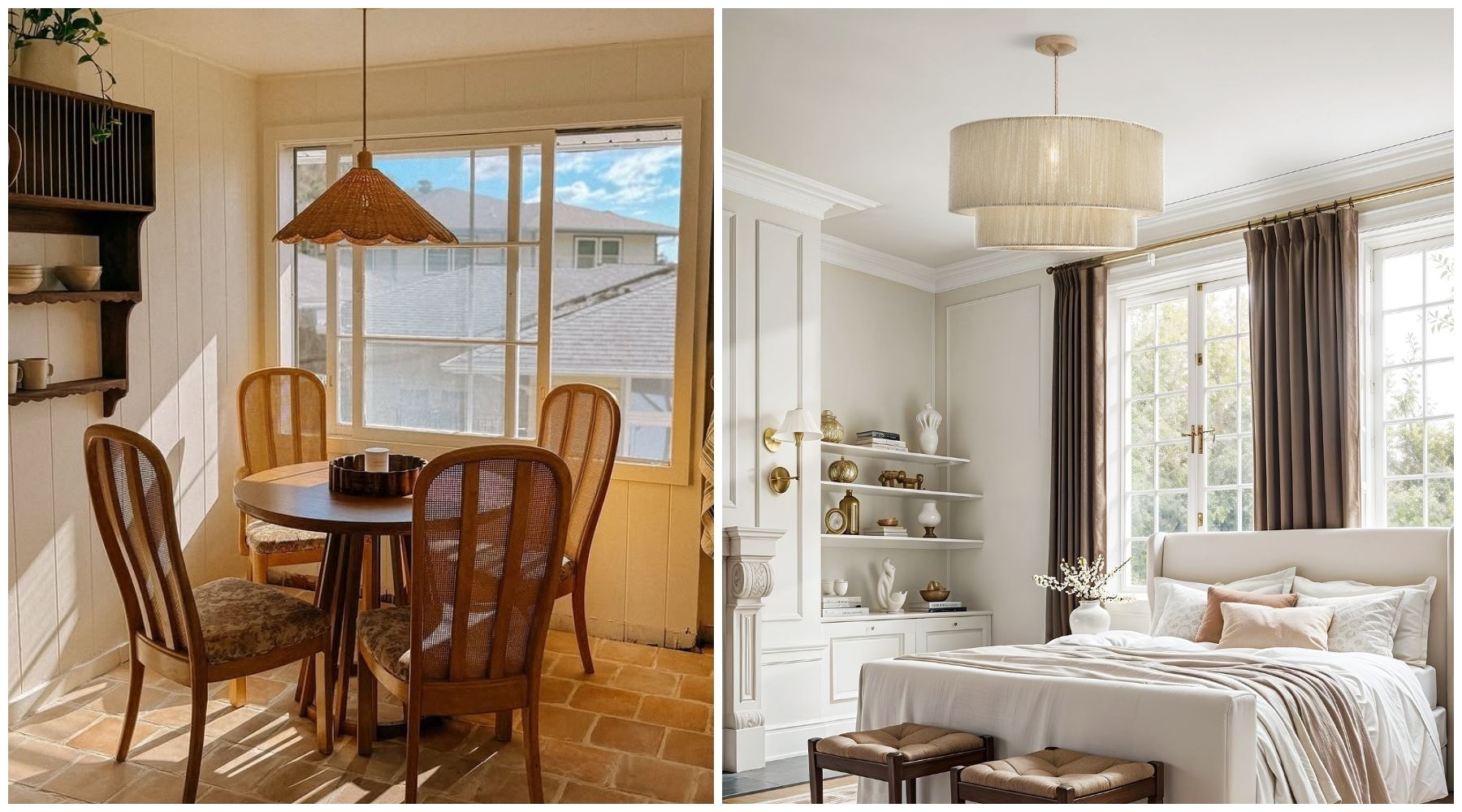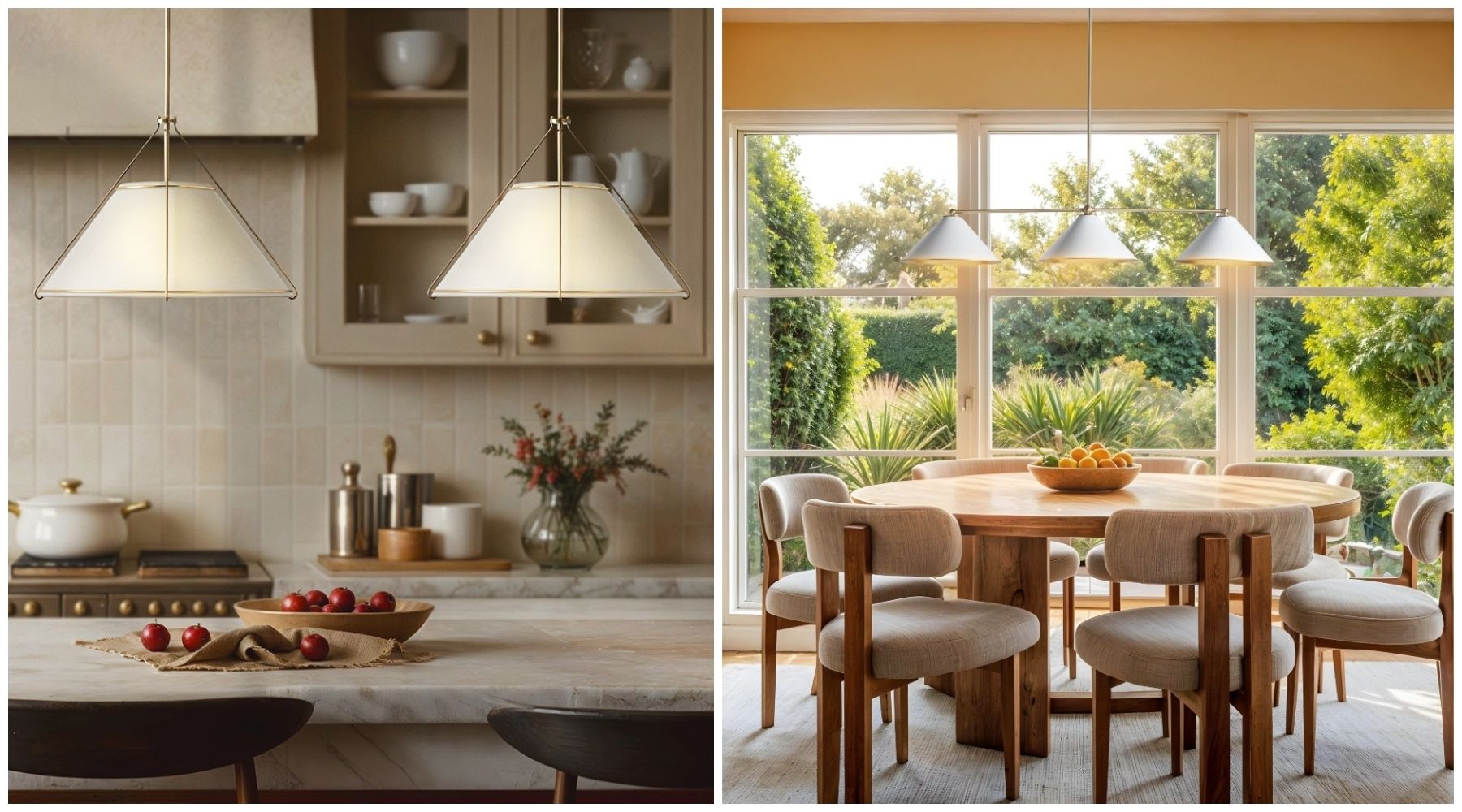Gifting has never been easier
Perfect if you're short on time or are unable to deliver your gift yourself. Enter your message and select when to send it.
DISPATCH IN 48 HOURS
Shop in-stock lighting
NEW YEAR SAVINGS
Get Member Price
THE STORY BEHIND OUR LIGHTS
Explore the Journey
RAFFIA SCONCES COLLECTION
See what's new
DISPATCH IN 48 HOURS
Shop in-stock lighting
NEW YEAR SAVINGS
Find your favorite
THE STORY BEHIND OUR LIGHTS
Explore the Journey
RAFFIA SCONCES COLLECTION
See what's new
Shopping Cart 0
Your cart is empty

Table of Contents
Free delivery between 9am-5pm on orders $200+
45-Day Return
Free delivery between 9am-5pm on orders $200+
45-Day Return
Free delivery between 9am-5pm on orders $200+
45-Day Return
Free delivery between 9am-5pm on orders $200+
45-Day Return
Wabi-sabi is one of the interior design trends gaining significant attention in interior design magazines and serves as a manifestation of our longing for inner tranquility, and harmony. It is undeniably one of the most accessible trends to adopt.
In the following passage, Rowabi offers some suggestions and concepts for incorporating Wabi-sabi into your living space.
Wabi-sabi is a Japanese philosophy that finds beauty in imperfection and the natural cycle of life. The term combines two concepts: "wabi" (侘), which originated in the 15th century and reflects simplicity, humility, and a connection to nature, and "sabi" (寂), which dates back to the 8th century and signifies the beauty found in aging and wear.
"Wabi" was initially associated with solitude in nature, but it evolved to represent a peaceful, uncluttered lifestyle. "Sabi," on the other hand, began as a poetic expression of desolation and later came to describe the elegance of objects as they age and weather.
Rooted in Zen Buddhism, Wabi-sabi encourages us to appreciate the imperfect, the fleeting, and the incomplete. This philosophy can be applied to objects, landscapes, and life itself, teaching us to find beauty in the simple and the aged.
Wabi-sabi interior design embraces the philosophy of finding beauty in imperfection and impermanence. Rooted in the Japanese aesthetic, this design approach values natural materials, organic shapes, and the passage of time. Instead of striving for perfection, Wabi-sabi interiors celebrate the uniqueness of worn textures, asymmetry, and the subtle elegance that comes with age.

The "beauty of imperfection" is one of the trending decorative themes now. Cre: @freepik via Freepik: https://www.freepik.com/author/freepik
Rooms designed with Wabi-sabi principles often feature earthy tones, handmade items, and furniture with visible grain or patina, creating a space that feels authentic and serene. The focus is on simplicity and functionality, with minimal decoration.
Overall, this style encourages a mindful approach to living, where every object has meaning and purpose, reflecting a deep connection to nature and the beauty of life’s fleeting moments.
Both Wabi-sabi and Japandi offer minimalist, nature-inspired approaches to interior design, but they differ in their underlying philosophies and aesthetic execution. Wabi-sabi’s embrace of imperfection and aging contrasts with Japandi’s focus on creating a balanced, functional, and modern environment.
Below is a more detailed comparison of the similarities and differences between these two styles that originate from Japan:
Focusing on minimalism: Both Wabi-sabi and Japandi embrace minimalism, focusing on simplicity and the essentials rather than excess. By avoiding clutter, these styles create spaces that feel calm and uncluttered.
Preferring natural materials: Both styles emphasize a strong connection to nature, incorporating natural materials such as wood, stone, and organic textiles.
Light up your inspiration. Find the glow that brings your ideas to life.
Applying neutral color palettes: Wabi-sabi and Japandi both favor neutral color schemes, typically using earthy tones, soft whites, and muted shades.
Prioritizing functionality: Practicality and functionality are key in both styles. Every piece of furniture and décor serves a purpose, ensuring the design is beautiful and also livable and efficient.
Aiming to a different philosophy: Wabi-sabi is rooted in Japanese aesthetics, emphasizing the beauty of imperfection, impermanence, and the natural aging process. It celebrates the flawed and the transient, encouraging acceptance of the natural cycle of life. Japandi, on the other hand, combines the Japanese minimalist approach with Scandinavian functionality, focusing more on creating a balanced, harmonious, and modern living environment.
Having different aesthetic approaches: Wabi-sabi interiors often feature rough, organic textures, weathered surfaces, and items that show signs of wear and age, reflecting the passage of time. Japandi, while also minimalist, tends to be more polished and sleek, with cleaner lines and a more organized appearance.
Incorporating different color use: While both styles use neutral tones, Wabi-sabi leans towards more earthy, muted colors that reflect nature’s imperfections. Japandi may incorporate slightly brighter, yet still neutral, shades that align with the Scandinavian influence, creating a lighter, airier feel.
Focusing on Imperfection vs. Perfection: Wabi-sabi finds beauty in flaws and asymmetry, often featuring handmade or worn objects that add character to the space. Japandi, while appreciating simplicity, tends to favor more refined, symmetrical, and well-crafted items that enhance the space’s functionality and aesthetic appeal.
Unlock designer style without the designer price tag. Shop ROWABI now:
Free delivery between Feb 5 - 6 on orders $200+
45-Day Return
Incorporating the art of Wabi-sabi into your home can involve several practices and intentional choices that celebrate imperfections and embrace the beauty of simplicity. Here are some suggestions on how to bring this Japanese lifestyle philosophy into your living space:
According to Marie Kondo, a renowned tidying expert, Wabi-sabi is deeply rooted in a profound respect for nature and its unadorned beauty. When incorporating this philosophy into your home's design, it is imperative to approach the process with mindfulness and introspection.
Every item you select for your living space plays a role in defining how you want to live your life.

Each item you choose for your living space shapes your lifestyle. Cre: Rowabi's customer | Daisy Cone Rattan Pendant Light
When adopting this philosophy in your home, it's important to resist the temptation of picking up glossy new home items. Instead, focus on selecting mindfully-chosen treasures that align with the principles of Wabi-sabi.
Whether it's a striking art piece or a vase hand-spun by your child, intentional choices are key to creating a space that celebrates authenticity.
According to Karin Sun, Founder of Crane & Canopy, the Wabi-sabi philosophy is rooted in the principles of asymmetry, simplicity, and intimacy. It encourages us to accept imperfections and value what is natural and authentic. To bring this philosophy into your home design, you can incorporate natural touches like plants.
Your next design centerpiece awaits. See the Rattan Pendant Light here:
Free delivery between Feb 5 - 6 on orders $200+
45-Day Return
Free delivery between Feb 5 - 6 on orders $200+
45-Day Return
Free delivery between Feb 5 - 6 on orders $200+
45-Day Return
Free delivery between Feb 5 - 6 on orders $200+
45-Day Return
Free delivery between Feb 5 - 6 on orders $200+
45-Day Return
Free delivery between Feb 5 - 6 on orders $200+
45-Day Return
Free delivery between Feb 5 - 6 on orders $200+
45-Day Return
Karin Sun suggests incorporating this Japanese philosophy into our daily lives, specifically in our bedrooms. Making the bed is a simple and effective way to embrace this Japanese lifestyle philosophy. Instead of striving for a perfectly tidy and spotless bed, we can embrace imperfections in a more relaxed manner.
Creating a cozy home environment is crucial, ensuring that you have a space where you can truly unwind and relax. According to Sun, incorporating elements like throw pillows and blankets can contribute to that lived-in, comfortable aesthetic. These additions are ideal for the essence of Wabi-sabi.
Adding washed linen to your home is a fantastic way to infuse a gentle and well-loved aesthetic that perfectly complements the core principles of this Japanese philosophy. Whether used as bedding or for kitchenware, linen's relaxed and naturally wrinkled appearance serves as a testament to the idea that beauty can truly be found in imperfections.

Cre: @pvproductions via Freepik: https://www.freepik.com/author/pvproductions
Opting for high-quality pieces that can withstand the test of time and bring character and substance to your space as they age. For instance, choosing items that naturally develop a patina or show signs of wear, such as a beautifully hand-carved solid wood cutting board or serving bowl.
Rather than feeling pressured to chase after the latest trends in homeware, take a moment to find joy in the imperfections that already exist within your home. You should let go of the constant pursuit of perfection and embrace the subtle beauty in the wrinkles on linen sheets or the charmingly slightly leaning stack of books.
You should embrace the Wabi-sabi philosophy by finding beauty in your everyday objects and routines. To make everyday tasks more memorable, you can turn your morning coffee or tea into a ritual. For example, you can grind your own beans or create a unique tea blend.
If you want to fully embrace the rustic vibes of Wabi-sabi, you can take it a step further by incorporating pendant lights made from materials like bamboo and rattan. Not only do these natural elements add a touch of organic beauty to your space, but they also align perfectly with the Wabi-sabi aesthetic.
By choosing Rowabi's bamboo or rattan pendant lights, you can bring a warm and rustic feel to your walls. These materials have a natural and effortless charm that effortlessly blends with the principles of this philosophy. The combination of the warm glow of pendant lights and the textured look of bamboo or rattan can create a cozy and inviting atmosphere in your home.

Embrace Wabi-sabi by finding beauty in everyday objects and routines. Cre: Rowabi's customer | Elaine Rattan Pendant Light
Wabi-sabi is a Japanese philosophy that emphasizes the beauty of imperfection and impermanence. The features of design according to this philosophy include:
Wabi-sabi design embraces imperfection as a fundamental principle, recognizing the inherent beauty found in flaws. Instead of seeking perfection, this design philosophy values the authenticity and uniqueness that imperfections bring to an object or space. Imperfection is seen as a reflection of the transient and evolving nature of life itself.
In this Japanese philosophy, imperfections are not something to be hidden or corrected, but rather celebrated and embraced. For example, a chipped ceramic bowl may be considered more beautiful than a perfectly pristine one because it adds depth to the object. This design encourages us to appreciate the imperfect and find beauty in the unconventional.
See the craftsmanship up close. View product details & pricing:
Free delivery between Feb 5 - 6 on orders $200+
45-Day Return
It reminds us that perfection is not necessary for a design to be beautiful, and that imperfection can add a layer of depth and character that enhances the overall aesthetic experience. Ultimately, this design reminds us that true beauty lies in the acceptance and celebration of imperfections, both in ourselves and in the world around us.
Wabi-sabi design philosophy appreciates and celebrates the inherent beauty that emerges over time. It acknowledges that objects and materials have the ability to change, develop a patina, and exhibit signs of wear and tear as they age. Instead of perceiving these changes as flaws, this philosophy embraces them as qualities that add depth to the design.
For example, the presence of rusted metal or tarnished copper elements adds a sense of rustic charm and visual interest. These materials exhibit a natural patina, a unique surface texture that develops over time due to exposure to the elements. The patina not only creates an aesthetically pleasing effect but also represents the ongoing transformation and evolution of the material.
The design philosophy of Wabi-sabi places a strong emphasis on incorporating natural materials into the aesthetic. These materials, including wood, stone, bamboo, clay, and paper, are chosen specifically for their ability to reflect the organic qualities of the world around us.

Wabi-sabi design prioritizes natural materials. Cre: Rowabi's customer | Daisy Cone Rattan Pendant Light
By using these materials, this design seeks to create an environment that honors the imperfections, the passage of time, and the inherent beauty of the natural world. The combination of wood, stone, bamboo, clay, and paper fosters a sense of connection and harmony, inviting a deeper appreciation for the simplicity and authenticity of the design.
The design philosophy of Wabi-sabi goes beyond the aesthetic aspects and extends to a broader concept of living mindfully and appreciating the present moment. It encourages individuals to cultivate an awareness of their surroundings and to find beauty in the ordinary and mundane aspects of life.
This Japanese philosophy also cherishes the transient and impermanent nature of existence. In a world that often prioritizes permanence and the pursuit of perfection, Wabi-sabi design offers an alternative perspective. It recognizes that everything is in a state of constant change and that nothing lasts forever.
This concept is reflected in the materials and design elements chosen, which often embrace the process of aging, weathering, and decay. By showcasing these qualities, this philosophy invites a sense of impermanence, reminding individuals to cherish each moment and find beauty in the ephemerality of life.
In Wabi-sabi design, there is a deep appreciation for the concept of empty spaces. They are not seen as mere voids but as integral components of the overall composition. These spaces provide breathing room and allow elements within the design to have their own presence and significance.
The inclusion of empty space in this design serves multiple purposes. Firstly, it creates a sense of visual balance. The juxtaposition of objects or materials against empty areas helps to create a harmonious relationship and a sense of order.
Empty spaces also contribute to the overall sense of tranquility in Wabi-sabi design. This concept decor gives the viewer a little period of peace and meditation in the middle of the visual aspects is beneficial. It provides room for the mind to find peace and allows for a deeper connection with the surrounding space.

Empty spaces in wabi- sabi design enhance the feeling of tranquility. Cre: @user11553839 via Frepik: https://www.freepik.com/author/user11553839
In this post, Rowabi offers 10 suggestions for applying Wabi-sabi design to your house. You may make your living area more structured and minimalistic by making use of the aforementioned solutions. Please feel free to contact us directly if you have any more questions, and we would be happy to help you as soon as possible!
What is the meaning of Wabi-sabi?
What are the three principles of Wabi-sabi?
What is the Wabi-sabi technique?
What is the difference between Wabi-sabi and Kintsugi?
What is another word for Wabi-sabi?
What is the symbol of Wabi-sabi?
How to create a Wabi-sabi home?
What are the colors of Wabi-sabi interiors?
Wabi-Sabi invites us to embrace the beauty of life's imperfections and the passage of time. By finding grace in the imperfect and the transient, this philosophy enriches our surroundings and daily experiences with a sense of calm and authenticity.
Table of Contents
Free delivery between 9am-5pm on orders $200+
45-Day Return
Free delivery between 9am-5pm on orders $200+
45-Day Return
Free delivery between 9am-5pm on orders $200+
45-Day Return
Free delivery between 9am-5pm on orders $200+
45-Day Return
Free delivery between 9am-5pm on orders $200+
45-Day Return
Free delivery between 9am-5pm on orders $200+
45-Day Return
Free delivery between 9am-5pm on orders $200+
45-Day Return
Free delivery between 9am-5pm on orders $200+
45-Day Return
Free delivery between 9am-5pm on orders $200+
45-Day Return
Free delivery between 9am-5pm on orders $200+
45-Day Return

Bohemian Interior Design: 10 Décor Ideas To Warm Up Your Space
Are you craving that Bohemian vibe in your home? Look no further! Dive into our guide on Bohemian style home décor ideas and discover how to infuse your living space with warmth and individuality. ...
Read more
Traditional Interior Design Style? Everything You Need to Know
As an interior designer with over 3 years of experience studying and researching interior design, lighting, and home décor transformations, I have developed a keen interest in the allure of traditi...
Read moreGifting has never been easier
Perfect if you're short on time or are unable to deliver your gift yourself. Enter your message and select when to send it.
